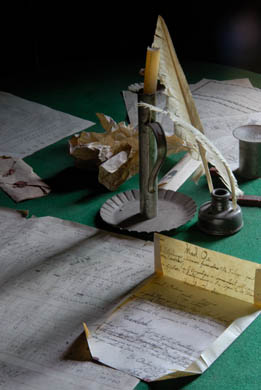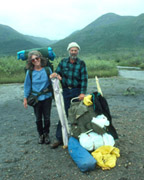New Jersey—Historic And Surprisingly Rural
PURSUING PHOTOS AND PROSE
With Kayaks, Mountain bikes, Backpacks, Daypacks, Walking Sticks, Fishing Poles—and an Airstream Travel Trailer
 Bert Gildart: Through the years, when I’ve traveled in New Jersey, I’ve generally been driving the Turnpike near Trenton, being scrunched between semis on three-lane madhouses. But New Jersey has another side to it, one that is surprisingly rural and that includes names other than Hoboken or Newark.
Bert Gildart: Through the years, when I’ve traveled in New Jersey, I’ve generally been driving the Turnpike near Trenton, being scrunched between semis on three-lane madhouses. But New Jersey has another side to it, one that is surprisingly rural and that includes names other than Hoboken or Newark.
If you take time to travel the northern part of the state, you’ll find a surprising assortment of quaint villages with names like Long Valley, Mendham, Chester, Hope, Tranquility, Great Meadows—and Morristown. You can select most any part of this state that’s off the interstate and, here, you can absorb a potpourri of rural American.
In the area in which we’ve been staying, we’ve discovered a fish hatchery; a number of state parks, such as Jenny Jump; a number of quiet country roads where farmers have placed their produce on tables asking that you select what you want and pay by the honor system—and a national park with a significant story to relate.
 To begin with, most of these attractions interpret pride in history and country and in some cases date back to the early 1700s. Not surprisingly, people in all these little towns are extraordinarily proud of their heritage, and most seem to be extraordinarily patriotic, displaying the American flag in various ways.
To begin with, most of these attractions interpret pride in history and country and in some cases date back to the early 1700s. Not surprisingly, people in all these little towns are extraordinarily proud of their heritage, and most seem to be extraordinarily patriotic, displaying the American flag in various ways.
Some display Old Glory from porches while others have taken the hours or even days, to paint one of the permanent structures, such as a house, and, as I discovered while bicycling one of the area’s rural roads, the entire side of an old barn. Flags, it seems, are flown without regard to political affiliation and are exhibited to say simply that “Here lives a proud American.”
Yet another surprise—as we’ve discovered while visiting family who live along Shades of Death Road—was the presence of a significant national park. The park is devoted essentially to the year George Washington was forced to winter in the little town of Morristown, more horrific than his winter at Valley Forge.
Morristown National Historic Park, though small, includes almost 30 miles of hiking trails and an interpretive program that explains the conditions of the times. The park includes the home where George Washington wintered and from which he delegated orders to troops of the newly formed Continental Army. That Army was housed in Jockey Hollow, which forms the bulk of this park.
Jockey Hollow is about a 20 minute drive from Morristown and is reached by following the Tempe Wick Road. “Tempe,” said the volunteer at the Wick House in Jockey Hollow, “was short for Temperance, a biblical association appropriate for the time when people were so extraordinarily—temperate. In those days,” said Pauline Kint, “women wore clothing that downplayed their femininity.”
 The area now comprising the national park was one that was carefully chosen by Washington. Here, he could maintain a watch on the British wintering around Manhattan Isalnd, guard the roads connecting New England with the Revolutionary capital at Philadelphia, and move swiftly to any threatening point. What he did not count on, however, was the severity of the 1779-1780 winter, the worst, at the time, in Morristown’s recorded history.
The area now comprising the national park was one that was carefully chosen by Washington. Here, he could maintain a watch on the British wintering around Manhattan Isalnd, guard the roads connecting New England with the Revolutionary capital at Philadelphia, and move swiftly to any threatening point. What he did not count on, however, was the severity of the 1779-1780 winter, the worst, at the time, in Morristown’s recorded history.
“That winter made Valley Forge look like a picnic,” said Kim Watts, another park interpreter, explaining the significance of the Wick House.
Because of the picturesque setting, we devoted much time to the Wick House. Kim detailed life as it was in those far off Colonial times, demonstrating techniques for tightening ropes on the bed, gardening, and techniques for creating fabrics.
As well, she explained the layout on one of the desks, which contained writing material. The results detailed the output of a soldier during Washington’s times, and the layout included a promissory note, a map and a ledger of troops and supplies.
All this was just another manifestation of the way in which New Jersey has emerged to so successfully tell a story about its rural past, a state with more than an adequate amount of resources to tell this story surprisingly well. That, however, is something residents have realized for years.

